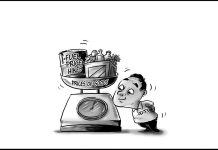
BY FR. SHAY CULLEN
THE PLATFORMS like Facebook allegedly have no conscience or interest to control or moderate the evil and corrupting content. They hide behind and are protected by Section 230 of the US Communications Decency Act. This must be changed. The people to be held responsible under the law in most countries are the persons that post the illegal material and those who access it.
The internet network connecting everybody with an account and the ISPs that use it and enable it to function have weak, ineffective or no blocking software installed and that allows the evil content and abusers to proliferate and spread. Powerful software is available to stop many images of child abuse but the telecommunication companies despite their billions of profits don’t use them. It is likely the software will slow down their systems and they might lose customers to other providers.
Philippine law says the ISPs should install blocking software (RA 11930). It seems they choose to ignore the law. It says, under Section 3(e), the telecommunications/ICT regulator, which is the National Telecommunications Commission, ……. under Section 9(a), has the authority to order internet intermediaries to immediately block access to, remove or take down the internet address, uniform resource locator (URL), websites, or any content thereof containing CSAEM (child sexual abuse and exploitation material) or involving streaming or live streaming of OSAEC (online sexual abuse and exploitation of children). The ISPs and telecoms seem to care more about making money than child safety.
In a comprehensive study, Unicef researchers discovered that one in every five Filipino children between the ages of 12 years old and 17 said that they were sexually abused online over the internet. It was established that 90 percent of the 950 children contacted and interviewed said that they were using Facebook and Facebook Messenger. The UNICEF research was done between January and April 2021. It also said that children reported the abused they experienced began through other sites like TikTok, Twitter,(now X) Instagram and Snapchat.
The female children were lured by a “boyfriend” to expose themselves on-line. They were recorded and blackmailed to pay not to have their compromising photos and videos sent to their family and classmates.
Others suffered when their private personal photos were circulated on Facebook without their permission. Many children worldwide have committed suicide because of sexploitation blackmail. The 15-year-old teenager allegedly raped and sexually assaulted by a priest in Cagayan, now in jail and on trial, was blackmailed to having sex with him. He admitted the criminal acts but claimed they were consensual. However, he videoed the acts and blackmailed the child to have sex with him. Eventually, she broke down and told her friends what he was doing to her.
Other children reported to UNICEF being sexually abused by Facebook contacts. They were ashamed or afraid to report the abuse. They continue to suffer in silence and bury the hurt and pain inside. All must work together to get the government to implement the law and control the evil content passing through the ISPs for the protection of the children and society. (www.preda.org)







